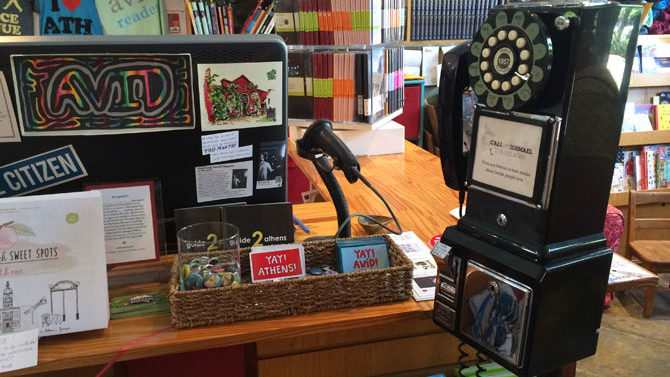One of the creators of literary project Call Me Ishmael, Logan Smalley, has given a phone to the fictional character Ishmael from Moby Dick and created a community for bibliophiles to share stories about books and find their next great read.
Call Me Ishmael launched a Kickstarter campaign on Nov. 3 to fund the creation and development of a unique device that looks like a vintage rotary pay phone but isn’t. Hoping to fund the first 10 phones, they aimed for $10,000. In less than two days, they surpassed their goal and sold out of the phones.
Back in the summer of 2014, Smalley—a University of Georgia alumnus, director of the documentary Darius Goes West and Athens native—discussed his favorite first lines of literature with his partner, Steph Kent, in a tavern in New York, where they live. They mentioned “Call me Ishmael,” from Moby Dick, and wondered, “What if Ishmael had a phone?” That question led them to get a phone number (774-325-0503) that, when called, goes straight to Ishmael’s voicemail. Callers can leave a short message about a book that changed their life, taught them something or became their new favorite book. Then, the Call Me Ishmael team record a video as they transcribe the voicemail on an old typewriter and match it to the caller’s audio.
The website has grown, and recently they’ve decided to answer the question, “What if Ishmael had a phone?” in a more literal sense.
Intended for independent bookstores, libraries and schools, the phones will allow people to push any number on the dial to hear one of the voicemails left by a caller. Using an app that connects to the phone, the owner or curator of the phone decides which stories to assign to the numbers and can change them out daily. Users can also leave new voicemails on the phone.
Clips from when they tested the prototype in Avid Bookshop on Prince Avenue appear in the Kickstarter video and show another unique feature of the phone: From the app, the owner of the phone can make the phone ring so people passing by can answer the call and listen to a voicemail to Ishmael. “I definitely, as an Athens native, wanted to run one of the first experiments in my hometown,” Smalley says. “I was really excited to see how the bookish people of Athens, GA would receive this literary device.”
Avid Bookshop will be one of the first places to get a Call Me Ishmael Phone in early 2016. “I am passionate and so honored to be getting one of the first phones,” owner Janet Geddis says.
The phones will cost $600–$1,000 to purchase or $30–$60 a month to rent, depending on how many phones the group builds. The Kickstarter campaign has raised more than $18,000 from more than 300 backers with 18 days left to go. The new goal is 500 backers, and if they meet it, 10 phones will go out to any school, library or bookstore that wants to try one for only the cost of shipping.
Although Smalley and Kent mainly had bookstores in mind when creating the phone, they’ve heard a lot of interest from librarians and teachers. For a school or library to purchase a phone could pose more barriers in terms getting funding approved in their budgets, but Kent says they’re paying attention and getting feedback from people who want them there.
The places these phones can go are endless, though. Smalley says they’ve had interest from coffee shop and bar owners, too. “In fact, The Globe expressed interest in potentially having one,” he says. “We’re excited to see all the different types of places this type of literary device makes sense.”
Although Avid Bookshop is the only place in Athens that’s definitely getting a phone, Smalley says he also tested one at the Athens-Clarke County Library and is in touch with them about possibly getting a phone.
Call Me Ishmael started as a passion project for Kent and Smalley, who met through work at TED, a nonprofit that produces viral videos of experts expounding on “ideas worth spreading.” Call Me Ishmael has garnered over 1,000 voicemails and one million listens. People have called and shared all kinds of stories—relatable and sometimes unexpected—about the books they’ve read. One of Smalley’s favorite voicemails is about the Dr. Seuss book The Sneetches and how it helped a man understand issues of race during his childhood in the civil rights movement and throughout his life.
A physical phone was the next logical step for Call Me Ishmael, because it helps put stories about books in the context of places where people are looking for something to read, such as a library or bookstore, Smalley says. “We’re excited to make these stories available in a really sort of interactive and enchanting way, so that when someone listens to a story they can be within arms reach of not only of the phone, but of the book the phone helps them discover,” he says.
Recommended Reads
You don’t necessarily have to call Ishmael to decide what to read next. Smalley and Kent offered Flagpole a few recommendations:
• Son of a Witch by Gregory Maguire (the sequel to Wicked)
• The Battle for Room 314 by Ed Boland
• Not on Fire, but Burning by Greg Hrbek
Like what you just read? Support Flagpole by making a donation today. Every dollar you give helps fund our ongoing mission to provide Athens with quality, independent journalism.










